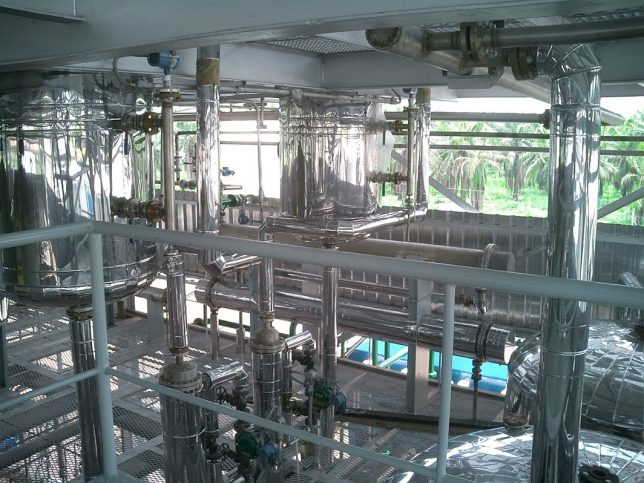The Benefits of Physical Refining in Oil Processing
Physical refining is a widely used technique in the oil industry that enhances purity and quality while minimizing environmental impact. This method is particularly popular for vegetable oils, as it relies on steam distillation instead of chemical treatments, ensuring a more sustainable and efficient process. With growing global demand for clean and eco-friendly food production, physical refining has become an essential step in delivering high-quality edible and industrial oils.
Understanding Physical Refining in Oil Processing
Unlike chemical refining, which relies on the addition of alkalis and acids to remove free fatty acids and impurities, physical refining uses high-temperature steam to achieve the same result. The process eliminates the need for harsh chemicals, making it a safer, more sustainable, and cost-effective approach. This method is especially beneficial for oils rich in free fatty acids, such as palm oil, sunflower oil, and soybean oil, where chemical refining may lead to undesirable residues or excessive processing steps.
The primary goal of physical refining is to enhance oil purity, stability, and taste while preserving its natural nutrients and beneficial compounds. By removing unwanted impurities through steam distillation, the oil retains its original properties, making it suitable for culinary, pharmaceutical, and cosmetic applications.
How Physical Refining Works
The process of physical refining in oil processing involves several carefully controlled steps to ensure that the final product meets industry standards for quality and safety.
The process begins with steam distillation, where high-temperature steam is passed through the oil. This allows for the removal of free fatty acids, oxidation by-products, and volatile impurities that could affect flavor, odor, and shelf life. Unlike chemical methods that require neutralization with alkali solutions, steam refining naturally separates impurities, reducing the formation of unwanted by-products.
Following the removal of impurities, the oil undergoes a cooling phase to stabilize its composition. During this stage, any remaining solid materials, waxes, or traces of heavy compounds are separated, ensuring a clear and purified final product. The cooling process also prevents thermal degradation, preserving the natural antioxidants and essential fatty acids that contribute to the oil’s nutritional benefits.
At the end of the refining process, the oil is filtered and polished to enhance its clarity, ensuring it is free from particulate matter or residual contaminants. This final step guarantees that the oil is safe, clean, and ready for use in food, personal care, and industrial applications.
Applications of Physically Refined Oils
Physically refined oils are widely used across various industries due to their high purity, stability, and natural composition.
In the food industry, physically refined oils are a preferred choice for cooking, frying, and baking. Since this refining method does not involve harsh chemical treatments, the resulting oil remains free from chemical residues, ensuring a clean and natural product. Many food manufacturers and culinary professionals opt for physically refined oils to maintain flavor integrity and nutritional value while meeting strict food safety regulations.
Beyond food production, cosmetic and pharmaceutical industries also rely on physically refined oils for their mild, non-irritating properties. In skincare and haircare products, these oils serve as natural emollients, helping to hydrate and nourish without introducing chemical additives. Their gentle refining process makes them suitable for sensitive skin formulations, baby care products, and dermatological treatments.
The industrial sector also benefits from physical refining, particularly in bio-based lubricants, eco-friendly waxes, and pharmaceutical-grade oil formulations. The ability to produce high-purity oils without chemical modification allows manufacturers to develop sustainable and biodegradable products with minimal environmental impact.
Why Physical Refining is the Preferred Choice
One of the most significant advantages of physical refining in oil processing is its ability to produce high-quality oils while minimizing chemical waste and resource consumption. By eliminating the use of strong alkalis and acids, this process significantly reduces the production of wastewater and toxic by-products, contributing to a more sustainable and environmentally responsible refining system.
Additionally, physical refining enhances oil stability, ensuring that the final product has a longer shelf life and greater resistance to oxidation and rancidity. This is particularly beneficial for edible oils that require extended storage periods without compromising taste, texture, or nutritional content.
From an economic perspective, physical refining is a more cost-efficient method, as it reduces the need for expensive chemical reagents and complex waste treatment systems. This makes it an attractive option for large-scale oil manufacturers, as it streamlines production efficiency while maintaining high-quality output.
Technoilogy’s Expertise in Physical Refining
As the demand for sustainable and high-performance oil refining solutions continues to grow, Technoilogy remains at the forefront of innovation in physical refining technology. Through advanced steam distillation systems, precision cooling mechanisms, and state-of-the-art filtration techniques, Technoilogy helps manufacturers optimize every stage of the refining process.
By integrating energy-efficient and environmentally responsible solutions, Technoilogy supports businesses in achieving superior oil quality while reducing carbon footprints and operational costs. The company’s cutting-edge refining technology ensures that physically refined oils meet the highest industry standards, offering safe, stable, and premium-grade products for various applications.
Conclusion
Physical refining has revolutionized the way vegetable and industrial oils are processed, offering a cleaner, safer, and more sustainable alternative to traditional chemical refining methods. Through the use of steam distillation and natural separation techniques, this process enhances oil purity, stability, and nutritional value while minimizing chemical waste and environmental harm.
With applications spanning food production, cosmetics, pharmaceuticals, and bio-based industrial solutions, physically refined oils continue to shape the future of high-quality oil processing. As industry leaders like Technoilogy develop innovative and energy-efficient refining solutions, businesses worldwide can benefit from superior oil quality, reduced production costs, and enhanced sustainability.

